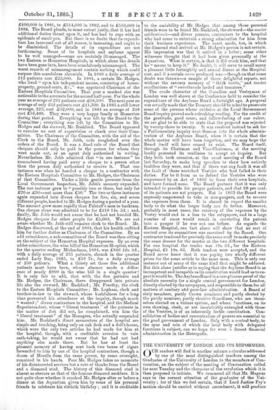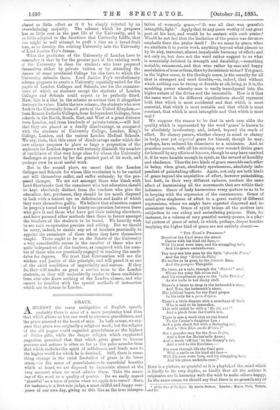THE T_TNIVERSITY OF LONDON AND ITS REFORMERS.
OUR readers will find in another column a circular addressed by one of the most distinguished teachers among the Graduates of the University of London to the members of Con- vocation, on the subject of the meeting of Convocation called for next Tuesday and the character of the revolution which it is then proposed to initiate. We commend all that Mr. Magnus says to the earnest attention of the graduates of the Uni- versity; for of this we feel certain, that if Lord Justice Fry's motion should be carried without amendment, it will produce
almost as little effect as if it be simply rejected by an overwhelming majority. The scheme . which he proposes has so little root in the past life of the University, and is so little adapted to the functions that University fulfils that • you might as well attempt to graft a vine on a bread-fruit tree, as to develop the existing University into the University of Lord Justice Fry's dream.
What the graduates of the University of London have to remember is that by far the greater part of the existing work of the University is done for students who have prepared themselves either by private tuition or by attending the classes of some provincial College for the tests to which the University submits them. Lord Justice Fry's revolutionary scheme proposes to create a University especially suited for the pupils of London Colleges and Schools, one for the examina- tions of which no students except the students of London Colleges and Schools could expect to be perfectly fitted. Now, this is a blot in the scheme so serious that it altogether . destroys its value. Under the new scheme, the students who now flock to the University from all parts of the United Kingdom,— from Roman Catholic Colleges, from Independent Colleges, from schools in the North, South, East, and West at a great distance from London, and from hundreds of private tutors,—will feel that they are placed at a deadly disadvantage,, as compared with the students of University College, London' King's College, London, and the various London Medical Schools. We say, then, that this sense of disadvantage under which the new scheme proposes to place so large a proportion of the aspirants for London degrees will seriously diminish the number of candidates of that very large class for whom the University discharges at present by far the greatest part of its work, and ,perhaps even its most useful work.
But in the second place, we . assert that the London Colleges and Schools for whom this revolution is to be carried • out will themselves suffer, and suffer -seriously, by the-pro- . posed changes. We are not amongst those who think with Lord Sherbrooke that the examiners who testeducatioushould
■ be kept absolutely distinct from the teachers • who give the education, lest, perchance, they should be too much disposed to look with a lenient eye on deficiencies and faults of which they were themselves guilty. We believe that education cannot be properly tested except by hearty co-operation-hetween those -who give it and those who have got their training elsewhere, andhave pursued other methods than those in favour amongst the teachers of the students to be tested. We heartily wish to see such co-operation genuine and willing. But we should be sorry, indeed, to enable any set of teachers practically to appoint the examiners of those whom they have themselves taught. There ought to be on the Senate of the University a very considerable excess in the number of _those who are quite independent of the teachers, as compared with the num- her of those who are practically engaged in teaching the candi- -dates for degrees. We trust that Convocation will see the wisdom and justice of this principle, and will guard it as one I of the chief conditions of impartiality and success. If they do, they will render as great a service even to the London students, as they will undoubtedly render to those candidates from afar who know nothing of the London classesr,and who cannot be familiar with the special methods of instruction which are in favour in London.







































 Previous page
Previous page